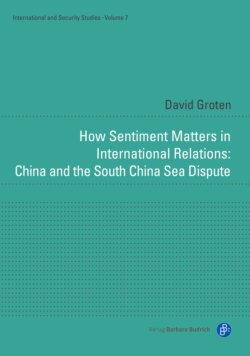Читать книгу How Sentiment Matters in International Relations: China and the South China Sea Dispute - David Groten - Страница 11
На сайте Литреса книга снята с продажи.
[23] 2. Analytical and Theoretical Framework
ОглавлениеThe research project at hand pursues a theoretical perspective closely related to political psychology and social constructivism. Commonly distinguishing between material and social reality, constructivism regards language and communication as crucial in terms of portraying, defining and modifying material reality. In this vein, material reality is socially constructed through communication and interaction (social reality) and is reflected in and shaped by language. That said, the subjective perception of social reality constitutes both the key assumption of constructivist thought and the starting point of this research project.
Against this background, respect and disrespect dynamics manifested in Chinese elite discourses pertaining to the SCS dispute constitute this project’s independent variable. The adopted approach builds upon the presumption that [24] any neglect of China’s social reality, including its self-evaluative respect needs and related preferences and self-evaluative motives, is problematic. Instead, a solid understanding of the PRC’s social reality and insights into its cognition and judgment of external behavior is indispensable for a robust understanding of China’s general order of preferences vis-à-vis the South China Sea dispute, now and in the future to come.
